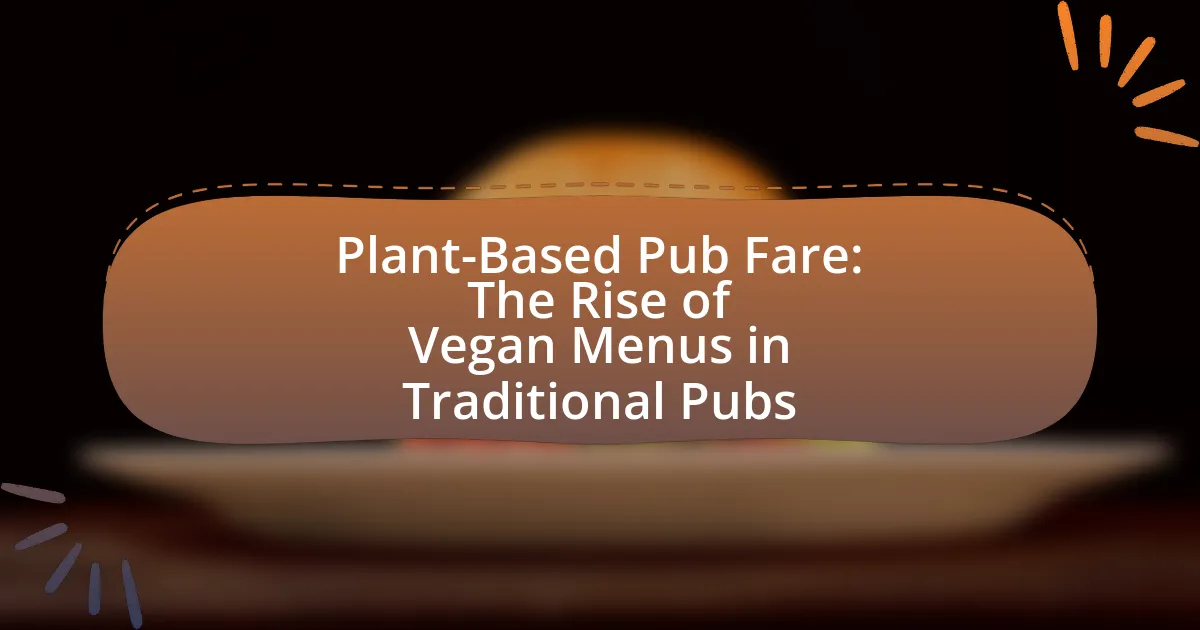Plant-Based Pub Fare refers to the growing trend of incorporating entirely plant-based menu items in traditional pubs, catering to the increasing demand for vegan and vegetarian options. The article explores the evolution of pub fare from meat-centric dishes to diverse plant-based offerings, highlighting the reimagining of traditional meals such as shepherd’s pie and fish and chips. It discusses the cultural influences shaping these menus, the demographic trends driving demand, and the health and environmental concerns motivating consumer choices. Additionally, the article addresses the challenges traditional pubs face in adopting vegan menus, strategies for effective implementation, and the financial implications of introducing plant-based options.

What is Plant-Based Pub Fare?
Plant-Based Pub Fare refers to menu items in pubs that are entirely made from plant-based ingredients, catering to vegan and vegetarian diets. This trend has emerged as traditional pubs increasingly incorporate vegan options to meet the growing demand for healthier and more sustainable dining choices. Research indicates that the plant-based food market is projected to reach $74.2 billion by 2027, highlighting the significant shift in consumer preferences towards plant-based diets.
How has the concept of pub fare evolved over time?
The concept of pub fare has evolved from simple, hearty meals primarily focused on meat and potatoes to a diverse range of options that now prominently feature plant-based dishes. Historically, traditional pub fare included items like fish and chips, shepherd’s pie, and bangers and mash, reflecting the agricultural and culinary practices of the regions. In recent years, the rise of veganism and increased awareness of dietary preferences have led many pubs to incorporate plant-based menus, offering dishes such as vegan burgers, jackfruit tacos, and quinoa salads. This shift is supported by statistics indicating that the vegan food market has grown significantly, with a report from the Plant Based Foods Association showing a 27% increase in sales from 2019 to 2020. Thus, the evolution of pub fare mirrors broader societal changes in food preferences and health consciousness.
What traditional dishes are being reimagined as plant-based options?
Traditional dishes being reimagined as plant-based options include shepherd’s pie, fish and chips, and burgers. Shepherd’s pie is often made with lentils or mushrooms instead of meat, while fish and chips are frequently replaced with battered and fried plant-based alternatives like jackfruit or tofu. Burgers are commonly crafted from ingredients such as black beans, chickpeas, or quinoa, providing a meat-free yet satisfying option. These adaptations cater to the growing demand for vegan menus in traditional pubs, reflecting a shift towards more inclusive dining experiences.
How do cultural influences shape plant-based pub fare?
Cultural influences shape plant-based pub fare by integrating local culinary traditions, dietary preferences, and ethical considerations into menu offerings. For instance, in regions with strong vegetarian or vegan traditions, such as India, pubs may feature dishes like chickpea curry or lentil-based options, reflecting the local palate. Additionally, the rise of health consciousness and environmental awareness in Western cultures has led to the inclusion of plant-based burgers and innovative vegetable dishes, catering to consumers seeking sustainable dining options. This shift is supported by statistics indicating that 39% of Americans are actively trying to incorporate more plant-based foods into their diets, demonstrating a significant cultural trend towards plant-based eating.
Why is there a growing demand for vegan menus in traditional pubs?
There is a growing demand for vegan menus in traditional pubs due to increasing consumer awareness of health, environmental sustainability, and animal welfare. Research indicates that 39% of UK adults are reducing their meat consumption, driven by concerns over health risks associated with meat and dairy products, as well as the environmental impact of livestock farming. Additionally, the rise of plant-based diets is supported by a 2021 survey from The Vegan Society, which found that 1 in 4 people in the UK are now choosing vegan options when dining out. This shift in consumer preferences compels traditional pubs to adapt their menus to attract a broader clientele and meet the evolving dietary choices of their patrons.
What demographic trends are driving this demand?
The demand for plant-based pub fare is primarily driven by the increasing number of health-conscious consumers and a growing awareness of environmental sustainability. Recent studies indicate that millennials and Generation Z are more likely to adopt vegan diets, with 39% of millennials identifying as flexitarians or vegetarians, according to a 2021 report by the Plant-Based Foods Association. Additionally, the rise in veganism is linked to a broader societal shift towards ethical consumption, with 70% of consumers expressing a preference for sustainable food options. This demographic trend reflects a significant cultural change, influencing traditional pubs to adapt their menus to meet the evolving preferences of their clientele.
How do health and environmental concerns influence consumer choices?
Health and environmental concerns significantly influence consumer choices by driving demand for plant-based options in traditional pubs. Consumers increasingly prioritize health benefits associated with plant-based diets, such as lower risks of chronic diseases, and are motivated by environmental factors like reducing carbon footprints and conserving resources. A survey by the Plant Based Foods Association found that 70% of consumers are more likely to purchase plant-based foods due to health benefits, while 63% cite environmental sustainability as a key factor in their food choices. This shift is evident in the rise of vegan menus in pubs, reflecting a broader trend towards healthier and more sustainable eating habits.

What are the key components of a successful vegan pub menu?
A successful vegan pub menu includes diverse offerings, appealing flavors, and nutritional balance. Diverse offerings ensure that there are options for various tastes, such as burgers, pizzas, and salads, which cater to both vegans and non-vegans. Appealing flavors are crucial; using herbs, spices, and creative cooking techniques enhances the taste of plant-based ingredients, making them more enticing. Nutritional balance is important to provide satisfying meals that meet dietary needs, incorporating proteins, healthy fats, and carbohydrates. Research indicates that menus with a variety of flavorful vegan options can increase customer satisfaction and attract a broader audience, as seen in the growing trend of plant-based dining in traditional pubs.
What types of plant-based ingredients are commonly used?
Commonly used plant-based ingredients include legumes, grains, vegetables, fruits, nuts, and seeds. Legumes such as lentils and chickpeas provide protein and fiber, while grains like quinoa and brown rice serve as nutritious bases. Vegetables, including leafy greens and root vegetables, offer essential vitamins and minerals. Fruits contribute natural sweetness and flavor, and nuts and seeds add healthy fats and texture. These ingredients are foundational in creating diverse and appealing vegan dishes, reflecting the growing trend of plant-based menus in traditional pubs.
How do these ingredients compare to traditional pub fare?
Plant-based ingredients in vegan menus significantly differ from traditional pub fare, which typically includes meat and dairy. Traditional pub fare often features items like beef burgers, fish and chips, and creamy pies, whereas plant-based options utilize ingredients such as legumes, grains, vegetables, and plant-based proteins. For example, a traditional beef burger can be replaced with a lentil or chickpea patty, offering a lower saturated fat content and higher fiber. Additionally, plant-based dishes often incorporate spices and herbs to enhance flavor, aligning with the growing trend towards healthier eating. This shift reflects a broader movement in the food industry towards sustainability and health-conscious dining, as evidenced by a 2021 report from the Plant-Based Foods Association, which noted a 27% increase in plant-based food sales in the U.S. over the previous year.
What role do local and seasonal ingredients play in vegan menus?
Local and seasonal ingredients are essential in vegan menus as they enhance flavor, promote sustainability, and support local economies. Utilizing these ingredients allows chefs to create dishes that reflect the region’s unique culinary identity and seasonal availability, ensuring freshness and optimal taste. Studies show that seasonal produce often contains higher nutrient levels and better flavor profiles compared to out-of-season alternatives. Furthermore, sourcing ingredients locally reduces carbon footprints associated with transportation, aligning with the ethical principles of veganism. This approach not only enriches the dining experience but also fosters community connections and encourages responsible consumption practices.
How can traditional pubs effectively implement vegan options?
Traditional pubs can effectively implement vegan options by incorporating a diverse range of plant-based dishes that appeal to both vegan and non-vegan customers. This can include offering vegan versions of traditional pub favorites, such as plant-based burgers, vegan shepherd’s pie, and hearty salads, which can attract a wider audience.
Research indicates that the demand for vegan options has increased significantly, with a 600% rise in the number of people identifying as vegan in the UK from 2014 to 2019, according to a study by The Vegan Society. By adapting their menus to include these options, traditional pubs can not only meet customer demand but also enhance their reputation and increase foot traffic.
What strategies can pubs use to market their vegan offerings?
Pubs can effectively market their vegan offerings by utilizing social media campaigns, hosting vegan-themed events, and collaborating with local vegan influencers. Social media platforms like Instagram and Facebook allow pubs to showcase visually appealing vegan dishes, reaching a broader audience and engaging potential customers. Hosting events such as vegan tasting nights or cooking classes can create community interest and attract both vegan and non-vegan patrons. Collaborating with local vegan influencers can enhance credibility and expand reach, as these influencers often have dedicated followings that trust their recommendations. According to a report by The Vegan Society, the vegan market is growing rapidly, with a 40% increase in the number of vegans in the UK from 2014 to 2019, indicating a significant opportunity for pubs to tap into this expanding demographic.
How can staff training enhance the customer experience with vegan menus?
Staff training can enhance the customer experience with vegan menus by equipping employees with the knowledge and skills to effectively communicate menu options and address customer inquiries. When staff are well-trained in the ingredients, preparation methods, and nutritional benefits of vegan dishes, they can provide personalized recommendations, ensuring customers feel informed and valued. Research indicates that knowledgeable staff can significantly influence customer satisfaction and loyalty, as they create a more engaging dining experience. For instance, a study published in the Journal of Hospitality & Tourism Research found that staff expertise directly correlates with positive customer perceptions and increased likelihood of return visits.

What challenges do traditional pubs face when adopting vegan menus?
Traditional pubs face several challenges when adopting vegan menus, primarily including ingredient sourcing, staff training, and customer acceptance. Ingredient sourcing can be difficult due to the limited availability of high-quality vegan products that meet traditional pub standards. Staff training is essential to ensure that employees understand vegan cooking techniques and can effectively communicate menu options to customers. Additionally, customer acceptance poses a challenge, as some patrons may resist changes to traditional offerings, impacting sales. According to a 2021 survey by the Vegan Society, 62% of respondents indicated they would be more likely to visit a pub with a vegan menu, highlighting the potential market but also the need for effective marketing strategies to shift perceptions.
How do perceptions of vegan food impact customer acceptance?
Perceptions of vegan food significantly impact customer acceptance by influencing their willingness to try and adopt plant-based options. Positive perceptions, such as viewing vegan food as healthy, innovative, or environmentally friendly, can lead to increased acceptance and demand for vegan menu items in traditional pubs. Conversely, negative perceptions, such as associating vegan food with blandness or dietary restrictions, can deter customers from choosing these options. Research indicates that 70% of consumers are more likely to try vegan dishes if they perceive them as flavorful and appealing, highlighting the importance of effective marketing and presentation in shaping customer attitudes towards vegan offerings.
What misconceptions exist about plant-based pub fare?
Misconceptions about plant-based pub fare include the belief that it lacks flavor and variety. Many people assume that plant-based options are limited to salads or bland dishes, which is inaccurate. In reality, plant-based pub fare can be diverse and flavorful, featuring items like vegan burgers, loaded nachos, and creative appetizers that utilize spices and cooking techniques to enhance taste. Additionally, some believe that plant-based meals are less satisfying than traditional pub fare; however, studies show that well-prepared plant-based dishes can be equally filling and enjoyable, often incorporating hearty ingredients like legumes, grains, and vegetables.
How can pubs overcome resistance from traditional patrons?
Pubs can overcome resistance from traditional patrons by gradually introducing plant-based options alongside classic offerings. This approach allows patrons to explore new flavors without feeling alienated from their familiar choices. Research indicates that 60% of consumers are open to trying plant-based meals when they are presented as part of a diverse menu (source: “Plant-Based Eating Trends,” Food Marketing Institute, 2021). By promoting these options through tastings or special events, pubs can create a welcoming environment that encourages traditional patrons to embrace the change.
What are the financial implications of introducing vegan options?
Introducing vegan options can lead to increased revenue for traditional pubs, as consumer demand for plant-based meals has surged. A study by the Plant Based Foods Association reported that the plant-based food market grew by 27% in 2020, indicating a significant shift in consumer preferences. By offering vegan options, pubs can attract a broader customer base, including vegans, vegetarians, and flexitarians, ultimately enhancing customer loyalty and frequency of visits. Additionally, vegan dishes often have lower ingredient costs compared to meat-based options, which can improve profit margins. Thus, the financial implications of introducing vegan options are largely positive, driven by market demand and cost efficiency.
How can cost management be balanced with quality in vegan offerings?
Cost management in vegan offerings can be balanced with quality by sourcing ingredients locally and seasonally, which reduces transportation costs and ensures freshness. Utilizing local suppliers often leads to lower prices and supports community economies, while also maintaining high-quality standards. For instance, a study by the Food and Agriculture Organization indicates that local sourcing can reduce costs by up to 30% compared to imported goods. Additionally, implementing efficient inventory management practices minimizes waste and maximizes the use of high-quality ingredients, further enhancing the overall value of vegan offerings without compromising quality.
What potential revenue streams can arise from a diverse menu?
A diverse menu can generate multiple potential revenue streams, including increased customer attraction, higher average spend per visit, and enhanced brand loyalty. By offering a variety of plant-based options, traditional pubs can appeal to a broader audience, including vegans, vegetarians, and health-conscious consumers, which can lead to a 20% increase in foot traffic, as reported by the National Restaurant Association. Additionally, diverse menu items can encourage customers to try multiple dishes, raising the average spend per visit. Furthermore, unique offerings can foster brand loyalty, resulting in repeat business and positive word-of-mouth, which is crucial for sustained revenue growth.
What best practices should pubs follow when creating vegan menus?
Pubs should prioritize ingredient transparency and diverse offerings when creating vegan menus. Ingredient transparency ensures that customers are informed about what is in their food, which builds trust and caters to dietary restrictions. Diverse offerings, including a variety of appetizers, main courses, and desserts, attract a wider audience and enhance customer satisfaction. Research indicates that 39% of consumers are actively trying to incorporate more plant-based foods into their diets, highlighting the demand for well-rounded vegan options. By focusing on these best practices, pubs can effectively meet the growing interest in vegan dining.
How can feedback from customers shape menu development?
Feedback from customers can significantly shape menu development by providing insights into preferences and dietary trends. For instance, when customers express a desire for more plant-based options, restaurants can adapt their menus to include vegan dishes, reflecting the growing demand for healthier and sustainable choices. Research indicates that 70% of consumers are more likely to choose a restaurant that offers plant-based options, highlighting the importance of customer feedback in menu innovation. By analyzing customer reviews and sales data, establishments can identify popular items and adjust their offerings accordingly, ensuring that the menu aligns with customer expectations and market trends.
What role does innovation play in maintaining interest in vegan options?
Innovation plays a crucial role in maintaining interest in vegan options by introducing new flavors, textures, and cooking techniques that enhance the appeal of plant-based dishes. For instance, advancements in food technology have led to the development of meat alternatives that closely mimic the taste and texture of animal products, such as Beyond Meat and Impossible Foods, which have gained significant popularity. These innovations not only attract traditional meat-eaters but also encourage repeat customers by offering diverse and exciting menu choices. Additionally, creative culinary approaches, such as fusion cuisine and gourmet presentations, further elevate vegan offerings, making them more enticing and accessible to a broader audience.
